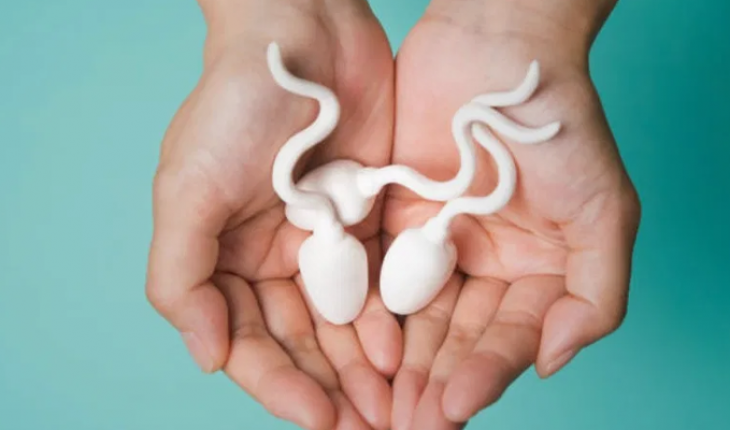As hard as it is to believe, there’s so much more to discover about semen and sperm.
However, it is also true that there are advances since the beginning of his study, a few centuries ago, when the mere idea of taking an interest in the subject was considered indecent, a sin.
But how much do you know about this slimy and fundamental liquid, fundamental to our reproduction?
BBC Mundo developed five aspects that you may find curious about sperm and the substance that contains them: semen. It was believed to be carrying miniature adults
In his fascinating report “The Long, Winding Tale of Sperm Science… and why it’s finally headed in the right direction,” Laura Poppick enters the 17th and 18th centuries to learn about early semen theories.
In the article, published on the smithsonian Institute website of the United States, Poppick says it was thanks to the then revolutionary microscope that biologists were able to see semen “in all its glory.”
In it, the writer points out:
“These early semen scientists found themselves tasked with answering the most basic questions, for example: Are sperm live animals? Are they parasites? And does each sperm contain a preformed adult little human curled inside?”
Poppick’s research highlights that the first scientist to concentrate on studying semen was the Dutchman Anton van Leeuwenhoek, who went down in history as the father of microbiology for his pioneering work in that field.
Van Leeuwenhoek developed the first composite microscope and used it to analyze lice and water samples from lakes in the mid-1670s. However, his friends urged him to focus his instrument on something else.
“But worried that writing about semen and intercourse might be indecent, did not advance. Finally, in 1677, he relented. When examining his own ejaculation, he was immediately shocked by the small ‘animaculacles’ he found writhing inside,” Poppick said.
He did not want to share what he discovered with his colleagues, but he did decide to inform the Royal Society of London (England’s most important scientific institution) about his findings.
“If the honourable Member believes that these observations may annoy or shock the scholars, I strongly urge the honourable Member to consider them private and to publish or destroy them as the honourable Member deems appropriate,” the scientist wrote.
The president of that body published them and thus a new field of study of biology was born. Before that, there were many theories about reproduction.
As biologist Bob Montgomerie of Queen’s University in Canada – who is quoted by Poppick – suggests that “the steam emitted by male ejaculation somehow encouraged women to make babies, while others believed that men actually made babies and transferred them to females for incubation.”
Following van Leeuwenhoek’s findings, “it was about 200 years before scientists agreed on how humans were formed.”
Some came to believe that each sperm had a tiny, completely preformed human being.
Do underwear affect your quality?
If you want to improve the quality of your sperm, consider using more boxers.
According to a Harvard University School of Public Health study published on August 8, it seems to confirm that the use of looser underpants could be a simple way for men to improve their sperm count and the hormones that control them. The study involved 656 men and those wearing boxerscortos had a 25% higher sperm concentration than men in tight underwear.
This is thought to be due to cold temperatures around the testicles.
And experts say this simple lifestyle change could improve men’s fertility.
What can men do to increase sperm count?
Sperm production is affected by temperatures above 34oC, which is why the testicles hang from the body.
Some tight-fitting underwear styles bring the scrotum closer to the body, causing the testicles to warm up, while others, such as boxers, are looser and colder. In the larger study of this type to date, the researchers found that men attending a fertility clinic in baggy underpants had a 17% higher sperm concentration, and that these were 33% moregiles (swimming capacity) than those of men wearing tight underwear.
Does what you eat influence their quality?
Nuts can help to have healthy semen, according to a study from the University Rovira i Virgili in Tarragano, in Spain.
Men who ate about two handfuls of almonds, hazelnuts and mixed nuts daily for 14 weeks improved their sperm count and had more viable “swimmers,” the researchers said.
The study, which was published in July, came amid what scientific sources have called a decrease in sperm count throughout the Western world, due in part to pollution, smoking and diet. Researchers said there was growing evidence that a healthy diet could increase your chances of conceiving.
Scientists randomly divided 119 healthy men between the ages of 18 and 35 into two groups:
A group was added 60 grams of nuts daily to their normal diet
The other was not changed to what they usually eat. Those in the group who ate nuts improved sperm:
The count by 14%
Vitality by 4%
Mobility by 6%
Morphology (shape and size) in 1%
These are all the parameters that the World Health Organization (WHO) lists as measurements of sperm quality and are associated with male fertility.
Experts said the study supported others that showed a diet rich in omega-3 fatty acids, antioxidants and vitamin B folic acid improved fertility.
“Evidence is accumulating in the literature that lifestyle changes, such as following a healthy dietary pattern, could help conception,” said Dr. Albert Salas-Huetos, who led the study.
Doesn’t always carry the same amount of sperm
The amount of sperm that men produce varies widely.
“In general, it is said that men can produce between 2 milliliters and 5 milliliters of semen every time they ejaculate,” explains biologist Mike Leahy and Hilary MacQueen, professor in the Department of Life, Health and Chemical Sciences at the Open University of England.
“And each milliliter can contain 20 million to 300 million sperm,” they add in the article “The Science of Sperm,” available on the Open University website. According to the researchers, that means that a fertile man “can produce between 40 million and 800 million sperm in total, although most produce between 40 and 60 million sperm per milliliter, giving an average total of 80 to 300 million sperm per ejaculation.”
Men, you’re not born producing it
Men are not born with the ability to produce semen. The ability develops at the beginning of puberty, when semen begins to be manufactured in small vessels inside the testicles known as seminiferous tubules.
When sperm are produced, they begin to mature in the epididymis, a narrow, elongated tube at the back of the testicle, and the deferential duct. From there they go to the urethra.
“The entire production and maturation process within the male body takes up to 74 days, but the usual average is around nine weeks,” the researchers at the Open University say.





